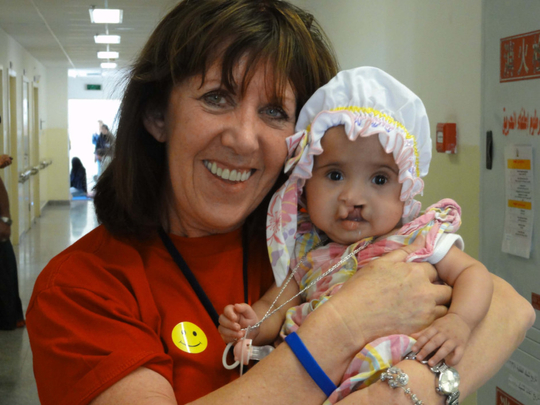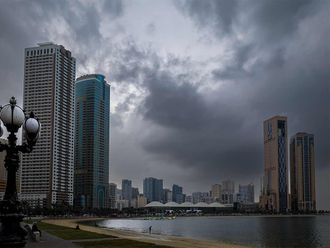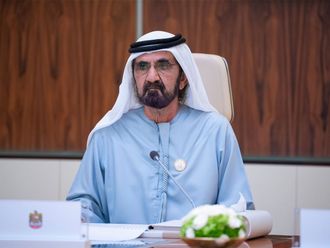
Abu Dhabi: It is the Year of Giving, and for the first time, a number of expatriate children in the UAE may be granted free procedures to correct their cleft lips and palates.
The surgeries will be provided by Operation Smile UAE, a non-profit medical service organisation that aims to provide safe surgical options for children born with cleft lips, cleft palates and other facial deformities.
The entity, which was first established internationally in 1982, began operations in the UAE in 2011. Since then, the UAE has funded 16 missions in a number of countries, and together, these provided corrective surgeries for more than 3,500 children, Morag Cromey-Hawke, executive director for Operation Smile UAE, told Gulf News.
“Just last week, we were in Jordan, and were able to help about 99 children in a week’s time. We hope to conduct at least two more missions this year, or perhaps even more because it is, after all, the Year of Giving,” she added.
Cleft lips and palates are orofacial congenital birth defects that affect the upper lip and the roof of the mouth. Cleft lips appear as a gap in the skin of the upper lip, and cleft palates are splits or openings in the roof of the mouth. These congenital deformities affect one in every 700 babies, and create difficulties in eating and speech, or result in frequent ear infections and dental problems.
Because many children around the world cannot afford corrective surgery, Operation Smile works to provide these for free. The UAE branch of the organisation was set up by Shaikha Alyazia Bint Saif Al Nahyan, wife of Shaikh Abdullah Bin Zayed Al Nahyan, UAE Minister of Foreign Affairs and International Cooperation. It has carried out missions in a number of countries, including Jordan, Ethiopia, Morocco, Ecuador, the Philippines, Vietnam, India, China and Madagascar.
“Our surgeons, nurses and other administrative and medical professionals volunteer their time. On average, providing each surgery costs us about Dh880,” Cromey-Hawke said.
The organisation was set up in the UAE to collect resources for missions in other countries, but since then, it has come across a number of expatriate children in the UAE who are unable to afford the procedures.
“At hospitals here, the corrective procedures could cost between Dh10,000 and Dh70,000, and they are often not covered by insurance for certain expatriate families. We have about 50 children listed on our database, and hope to help some of them this year,” Cromey-Hawke said.
The organisation organises events throughout the year to collect funds for its missions.
“Just last month, we organised a book sale that raised Dh50,000, and we will hold another in October,” she said.
Operation Smile has also tied up with music-and-movement group Music Monkeys to organise what it expects will be the largest music class in the country for children aged up to six years.
This year, the organisation is also hoping to galvanise volunteers towards stitching sheets. These will be used to provide post-surgery bedding for children in the poorest countries.
Asked about what would help Operation Smile provide even better support for affected children, Cromey-Hawke said that a parental support group in the UAE would be ideal.
“It would be nice to have companies that would fund support sessions for parents. We would have paediatricians teach them how to feed and take care of babies born with cleft lips and palates. In addition, we also pay the rent for our offices, and having that covered would be [an additional bonus],” she said.
“We would also really like an ‘awareness bus’ that could reach out to people across the UAE for a year and recruit more volunteers for our programmes,” Cromey-Hawke added.











